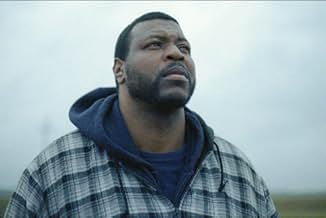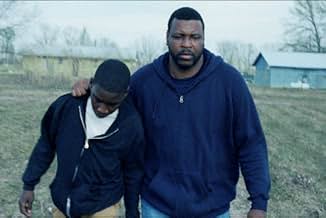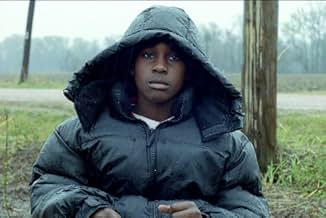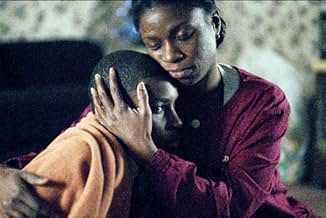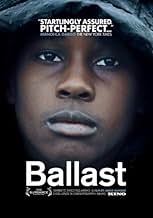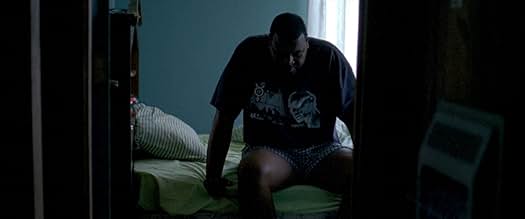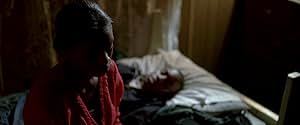IMDb RATING
6.9/10
2.5K
YOUR RATING
A drama set in the Mississippi delta, where one man's suicide affects three people's lives.A drama set in the Mississippi delta, where one man's suicide affects three people's lives.A drama set in the Mississippi delta, where one man's suicide affects three people's lives.
- Awards
- 17 wins & 21 nominations total
Neil Pettigrew
- Dispatcher
- (voice)
Sanjib Shrestha
- Dr. Shrestha
- (as Dr. Sanjib Shrestha)
- Director
- Writer
- All cast & crew
- Production, box office & more at IMDbPro
Featured reviews
I first became interested in Ballast when I heard about its setting: it's very rare to find a film set in the Mississippi Delta. It's also quite rare to find a serious drama with mostly black characters. I was afraid that this would either be a sappy melodrama or an attempt to make some "profound" point about how racism exists and is, like, bad and stuff. Thus I was quite pleased to find that this film manages to have a uniquely Southern setting without resorting to clichés or caricatures and that making some grand social statement is evidently the last thing on the mind of first time director Lance Hammer. Instead, we have a deliberately paced character study with a nicely handled mise en scene.
The film opens with the attempted suicide of Lawrence, a shopkeeper distressed over the (extremely) recent death of his twin brother/partner/only friend. Lawrence's recovery is complicated by his brother's will which indicates that the recently deceased man's ex-wife and teenage son are entitled to his share of the store and part of the property the brothers had co-habitated. Things start off tense due to the boy's involvement with some disreputable older boys that he owes money and stay that way due to Lawrence's troubled partnership with the boy's mother. This is a quiet, contemplative film for the most part and it offers no easy resolutions. Instead, it manages to realistically capture some unique characters in a woefully ignored section of American society.
The film opens with the attempted suicide of Lawrence, a shopkeeper distressed over the (extremely) recent death of his twin brother/partner/only friend. Lawrence's recovery is complicated by his brother's will which indicates that the recently deceased man's ex-wife and teenage son are entitled to his share of the store and part of the property the brothers had co-habitated. Things start off tense due to the boy's involvement with some disreputable older boys that he owes money and stay that way due to Lawrence's troubled partnership with the boy's mother. This is a quiet, contemplative film for the most part and it offers no easy resolutions. Instead, it manages to realistically capture some unique characters in a woefully ignored section of American society.
If I want to spend a few hours out of my day to get to a cinema and spend my money to watch a film, any film, then I want it to be worthwhile. Believe me, Ballast I would have paid for twice, it's that good. And I'll be buying the DVD too.
During the Glasgow Film Festival this year, this (to us) obscure, indie film played at a multiplex and my husband - who actually met the director at the London Film Festival - urged me to see it. Why? Because I'm also a filmmaker, so I share with the director, Lance, the desire to eschew the commercial imperative when it comes to telling straight stories.
Lance, if you read this - I adored this film. It's everything - flaws and all - that I want to see on screen. The integrity of the cast, no matter where you found them, the screen craft - the photography, script, design, sound, edit, costume, makeup - or judicious lack of - all fell into place. It's what they say about making films - so many get made, but so seldom do the planets align to make a beautiful one. This to me is the bomb. I love it.
I wish you every success in your future projects.
May Miles Thomas, Elemental Films, UK
During the Glasgow Film Festival this year, this (to us) obscure, indie film played at a multiplex and my husband - who actually met the director at the London Film Festival - urged me to see it. Why? Because I'm also a filmmaker, so I share with the director, Lance, the desire to eschew the commercial imperative when it comes to telling straight stories.
Lance, if you read this - I adored this film. It's everything - flaws and all - that I want to see on screen. The integrity of the cast, no matter where you found them, the screen craft - the photography, script, design, sound, edit, costume, makeup - or judicious lack of - all fell into place. It's what they say about making films - so many get made, but so seldom do the planets align to make a beautiful one. This to me is the bomb. I love it.
I wish you every success in your future projects.
May Miles Thomas, Elemental Films, UK
Winner of cinematography and director awards at the Sundance Film Festival and nominated for the Jury Prize at Sundance and Berlin, Lance Hammer's Ballast is an American original. Performed by non-professional actors and shot with a hand-held camera, the film looks at the lives of three distraught people in the Mississippi Delta, conveying with passion their ability to discover their own humanity and transcend the circumstances of their life. Using only the ambient sounds of nature, and portraying events in an elliptical manner that forces us to fill in the blanks, Ballast is reminiscent of the minimalist masterpieces of the Dardennes' and Charles Burnett, but has a unique rhythm all its own.
Shot on 35 mm along the Mississippi Delta, it is a film that quickly establishes mood and suspense and creates an emotional range that travels from anger and sadness to hope and joy. As the film opens, 12 year-old James (JimMyron Ross) chases a flock of birds in an open cotton field during the winter. The camera then shifts to a distraught man, Lawrence (Michael J. Smith, Sr.) sitting alone in his living room in the house next to his sister-in-law, Marlee (Tarra Riggs). The man is paralyzed with depression and unable to communicate due to the death of his brother Darius who, as discovered by a neighbor John (Johnny McPhail), has died in his bed of a self-inflicted overdose. Sullenly, Lawrence responds to the tragedy by going outside and shooting himself in the lungs. Rushed to the hospital, he is badly wounded but recovers after several weeks in the hospital.
In trouble with dope dealers, young James keeps his working mother from discovering that he owes $100 for crack cocaine, but it is revealed when James' TV is taken by the gang and both mother and son are assaulted in their cars. James, who owns a scooter, rides to Lawrence's place and demands his father's money at gunpoint. Things seem to hit rock bottom when Marlee is fired from her job cleaning toilets and Lawrence, still in shock, is unable to reopen his small food market. With nowhere to go but up, the three begin a long process of discovery of their indelible connection to life and to each other.
Unfolding like a documentary, Ballast conveys a sense of immediacy and a lyricism that gathers momentum as the film progresses. Accents are difficult to fathom (the film wisely provides English subtitles), yet there is a naturalism and authenticity here that keeps us engaged throughout. While none of the actors have ever acted before, you would not know it from the power of their performances, especially from Tarra Riggs and young Ross. It is a film, however, that definitely requires patience from the viewer. There are no markers to tell us what we are supposed to feel about the people we see on the screen, yet we remain tuned in to their struggles as if they were our own and in many respects they are. As they discover that who they are is larger than their circumstances, we discover a similar truth in our own life.
Shot on 35 mm along the Mississippi Delta, it is a film that quickly establishes mood and suspense and creates an emotional range that travels from anger and sadness to hope and joy. As the film opens, 12 year-old James (JimMyron Ross) chases a flock of birds in an open cotton field during the winter. The camera then shifts to a distraught man, Lawrence (Michael J. Smith, Sr.) sitting alone in his living room in the house next to his sister-in-law, Marlee (Tarra Riggs). The man is paralyzed with depression and unable to communicate due to the death of his brother Darius who, as discovered by a neighbor John (Johnny McPhail), has died in his bed of a self-inflicted overdose. Sullenly, Lawrence responds to the tragedy by going outside and shooting himself in the lungs. Rushed to the hospital, he is badly wounded but recovers after several weeks in the hospital.
In trouble with dope dealers, young James keeps his working mother from discovering that he owes $100 for crack cocaine, but it is revealed when James' TV is taken by the gang and both mother and son are assaulted in their cars. James, who owns a scooter, rides to Lawrence's place and demands his father's money at gunpoint. Things seem to hit rock bottom when Marlee is fired from her job cleaning toilets and Lawrence, still in shock, is unable to reopen his small food market. With nowhere to go but up, the three begin a long process of discovery of their indelible connection to life and to each other.
Unfolding like a documentary, Ballast conveys a sense of immediacy and a lyricism that gathers momentum as the film progresses. Accents are difficult to fathom (the film wisely provides English subtitles), yet there is a naturalism and authenticity here that keeps us engaged throughout. While none of the actors have ever acted before, you would not know it from the power of their performances, especially from Tarra Riggs and young Ross. It is a film, however, that definitely requires patience from the viewer. There are no markers to tell us what we are supposed to feel about the people we see on the screen, yet we remain tuned in to their struggles as if they were our own and in many respects they are. As they discover that who they are is larger than their circumstances, we discover a similar truth in our own life.
10ephes3
A movie about life after suicide can be very hard to depict, Ballast brings out the reality of life after suicide and the consequences of those actions. Filming in the South was excellent. The realness of what can happen after suicide was depicted in James' character. So many kids who loose a parent (especially a father) turn to the rough side of life. Marlee and Lawrence's characters were so real. Both of them should be commended for their acting skills. This is a must see film. The entire cast was very good. Lance Hammer did an excellent job in writing, directing, and producing this film.I was wondering if this was written from true accounts? The plot is so real to what is happening today, especially in the south. James and Lawrence's characters were very believable. Using local non-professional actors was risky, but all of them did an awesome job. There is so much talent in the south. Kudos to the entire cast including those who spoke only by body language.I hope this film wins lots of awards. I hope to see more of Lance Hammer's work.
"Ballast" is an independent film which many critics went "ballistic" with and was even nominated for several Independent Sprit Awards last year. Did it deserve it? No. Should it be ignored? No. "Ballast" stars Tarra Riggs as Marlee, an impoverished black mother living in rural Mississippi trying her best to make ends meat to raise her tweenage son James. James is a young drug addict who goes to extreme measures to support his drug habit. Example: James nonchalantly enters his Uncle Lawrence's home and holds him up at gunpoint to obtain money to purchase the drugs. Lawrence, "The Man From U.N.C.L.E. himself, depressive nature does not make him fight off the rebellious immaturity of James. Lawrence is profoundly grieving the suicide death of his twin brother Darrius, who was married to Marlee and is James' papa; even though Marlee & James despised Darrius because of his desertion of them both. Marlee eventually discovers James unrighteous ways and even loses her job. The desperate Marlee has no choice but to seek the assistance of neighbor Uncle Lawrence even though she has loathed him also because of his brother's actions. What happens next is a commending story of the power of connectivity of people going through harsh times and letting their unforgiving nature behind for the betterment of a child. Therefore, the central fixation is on sacrificing hang-ups in order to help a boy alter his self-destructive habits in order for him to have a promising & hopeful future. The performances of Michael Smith as Lawrence and the aforementioned Riggs as Marlee were authentically solid. Especially Smith's work, who spoke volumes with his non-verbal acting on the internal emotional pain of losing a loved one. JimMyron Ross as James was mediocre at best, but there were signs that with some more thespian training, the young Ross could have a successful acting future. Writer-Director Lance Hammer did nail the character development of the protagonists residing in poverty-stricken small town Mississippi, but I think Hammer screwed it up a bit on orchestrating too many stale & elongated scenes. Kudos does go out to the film's thematic & symbolist cinematography. "Ballast" is a mostly melancholy story which I do not think you will have a "ball" with, but it is a reliable moral narrative on the human nature of resiliency that deserves to be experienced. *** Average
Storyline
Did you know
- TriviaMicheal J. Smith Sr. (who plays Lawrence) had to be persuaded to make the film as he had no interest in such things. In real life, he works for the Public Services Commission in Yazoo City, Mississippi and was discovered attending his local church.
- ConnectionsReferenced in Film Junk Podcast: Episode 245: Fantastic Mr. Fox (2009)
- SoundtracksI'll Wait For Jesus
Traditional
Arranged by Clora T. Handy & Ann Nichols
Performed by The Canton Gospel Chorus
Courtesy of Talk of the Town Records
Details
Box office
- Budget
- $700,000 (estimated)
- Gross US & Canada
- $77,556
- Opening weekend US & Canada
- $8,572
- Oct 5, 2008
- Gross worldwide
- $81,864
- Runtime1 hour 36 minutes
- Color
- Sound mix
- Aspect ratio
- 2.35 : 1
Contribute to this page
Suggest an edit or add missing content



